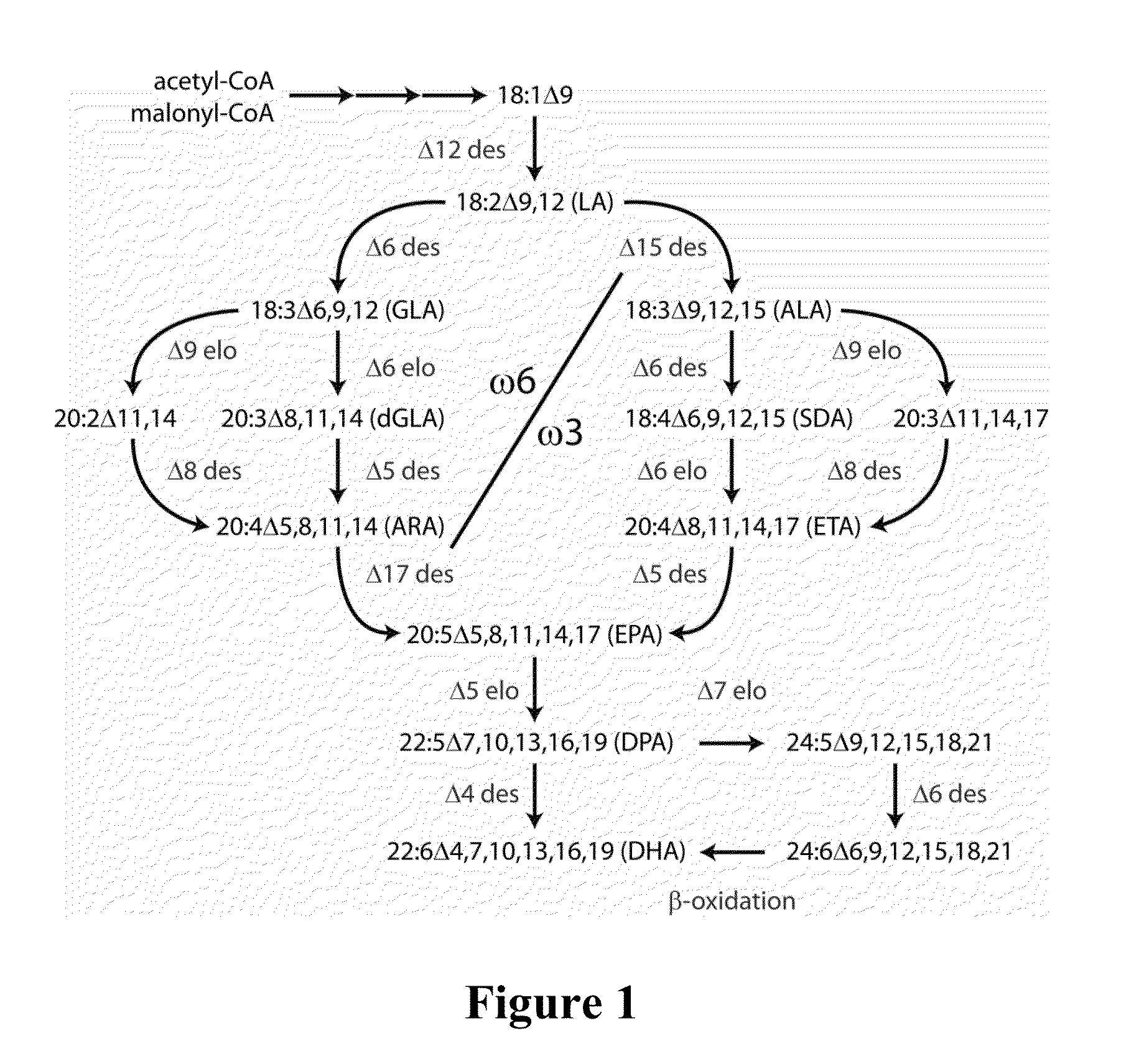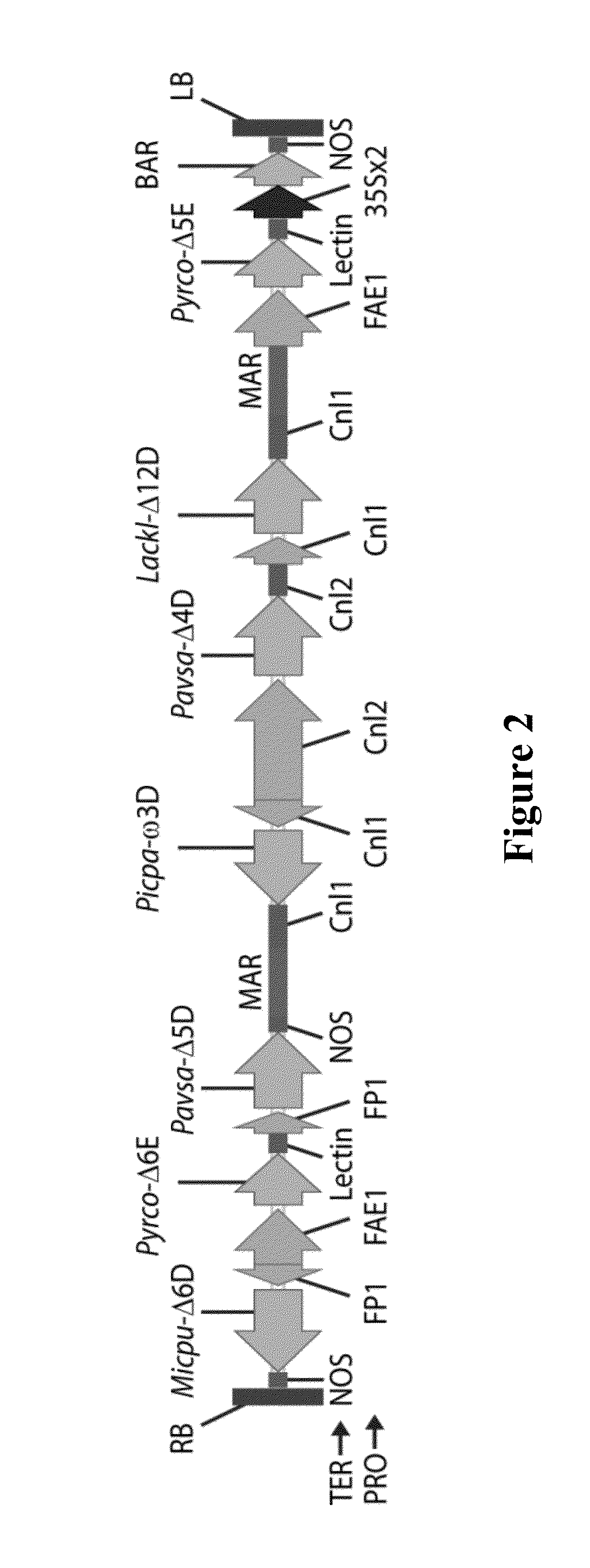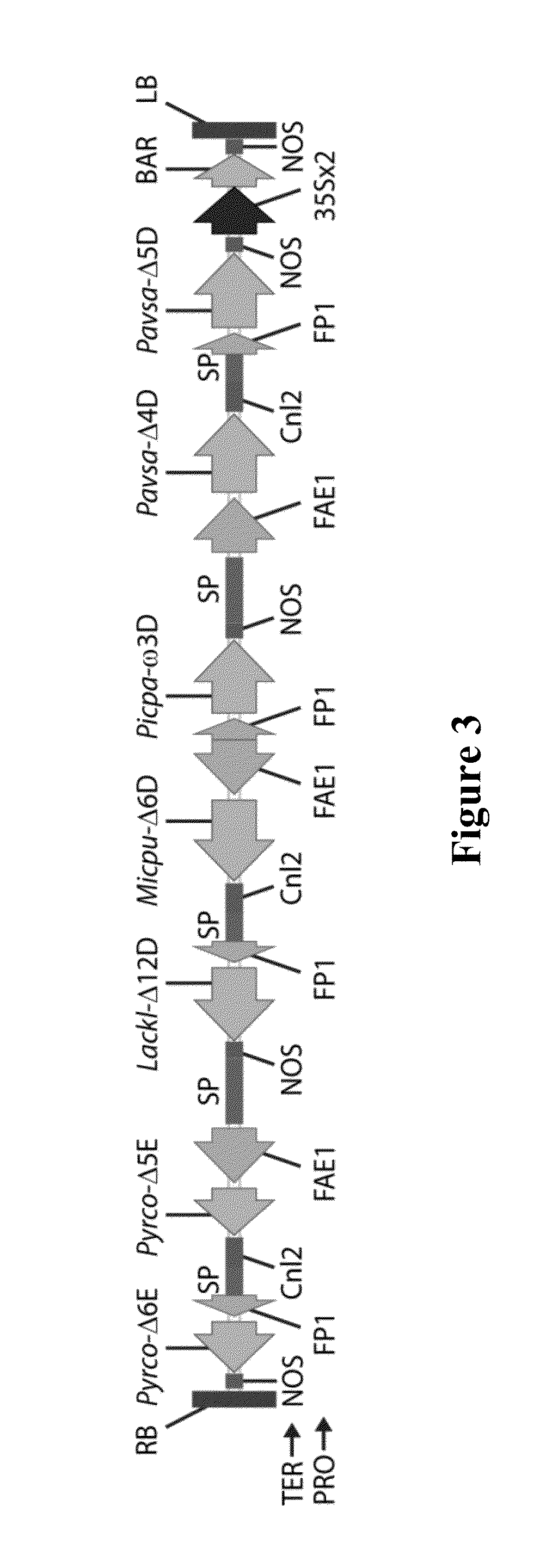Process for producing ethyl esters of polyunsaturated fatty acids
a polyunsaturated fatty acid and ethyl ester technology, applied in the direction of transesterification, dna/rna fragmentation, plant/algae/fungi/lichens ingredients, etc., can solve the imbalanced diet of most modern societies, flowering plants, lack of the capacity to synthesise polyunsaturated fatty acids with longer chains, etc., to achieve high levels of dha
- Summary
- Abstract
- Description
- Claims
- Application Information
AI Technical Summary
Benefits of technology
Problems solved by technology
Method used
Image
Examples
example 1
Materials and Methods
Expression of Genes in Plant Cells in a Transient Expression System
[0630]Exogenous genetic constructs were expressed in plant cells in a transient expression system essentially as described by Voinnet et al. (2003) and Wood et al. (2009). Plasmids containing a coding region to be expressed from a strong constitutive promoter such as the CaMV 35S promoter were introduced into Agrobacterium tumefaciens strain AGL1. A chimeric gene 35S:p19 for expression of the p19 viral silencing suppressor was separately introduced into AGL1, as described in WO 2010 / 057246. The recombinant Agrobacterium cells were grown at 28° C. in LB broth supplemented with 50 mg / L kanamycin and 50 mg / L rifampicin to stationary phase. The bacteria were then pelleted by centrifugation at 5000 g for 15 min at room temperature before being resuspended to OD600=1.0 in an infiltration buffer containing 10 mM MES pH 5.7, 10 mM MgCl2 and 100 μM acetosyringone. The cells were then incubated at 28° C. w...
example 2
Stable Expression of Transgenic DHA Pathways in Arabidopsis thaliana Seeds
Binary Vector Construction
[0643]The binary vectors pJP3416-GA7 and pJP3404 each contained seven heterologous fatty acid biosynthesis genes, encoding 5 desaturases and 2 elongases, and a plant selectable marker between the left and right border repeats of the T-DNA present in each vector (FIGS. 2 and 3). SEQ ID NO:1 provides the nucleotide sequence of the T-DNA region of pJP3416-GA7 from the right to left border sequences. Both genetic constructs contained plant codon-optimised genes encoding a Lachancea kluyveri Δ12-desaturase (comprising nucleotides 14143-16648 of SEQ ID NO:1), a Pichia pastoris ω3-desaturase (comprising nucleotides 7654-10156 of SEQ ID NO:1), a Micromonas pusilla Δ6-desaturase (comprising nucleotides 226-2309 of SEQ ID NO: 1), Pavlova salina Δ5- and Δ4-desaturases (comprising nucleotides 4524-6485 and 10157-14142 of SEQ ID NO:1, respectively) and Pyramimonas cordata Δ6- and Δ5-elongases (com...
example 3
Stable Expression of a Transgenic DHA Pathway in Camelina sativa Seeds
[0656]The binary vector pJP3416-GA7 as described above was introduced into A. tumefaciens strain AGL1 and cells from a culture of the transformed Agrobacterium used to treat C. sativa flowering plants using a floral dip method for transformation (Lu and Kang, 2008). After growth and maturation of the plants, the T1 seeds from the treated plants were harvested, sown onto soil and the resultant plants treated by spraying with the herbicide BASTA to select for plants which were transgenic for, and expressing, the bar selectable marker gene present on the T-DNA of pJP3416-GA7. Surviving T1 plants which were tolerant to the herbicide were grown to maturity after allowing them to self-fertilise, and the resultant T2 seed harvested. Five transgenic plants were obtained, only three of which contained the entire T-DNA.
[0657]Lipid was extracted from a pool of approximately twenty seeds from each of the three plants that con...
PUM
| Property | Measurement | Unit |
|---|---|---|
| area | aaaaa | aaaaa |
| w/w | aaaaa | aaaaa |
| w/w | aaaaa | aaaaa |
Abstract
Description
Claims
Application Information
 Login to View More
Login to View More - R&D
- Intellectual Property
- Life Sciences
- Materials
- Tech Scout
- Unparalleled Data Quality
- Higher Quality Content
- 60% Fewer Hallucinations
Browse by: Latest US Patents, China's latest patents, Technical Efficacy Thesaurus, Application Domain, Technology Topic, Popular Technical Reports.
© 2025 PatSnap. All rights reserved.Legal|Privacy policy|Modern Slavery Act Transparency Statement|Sitemap|About US| Contact US: help@patsnap.com



